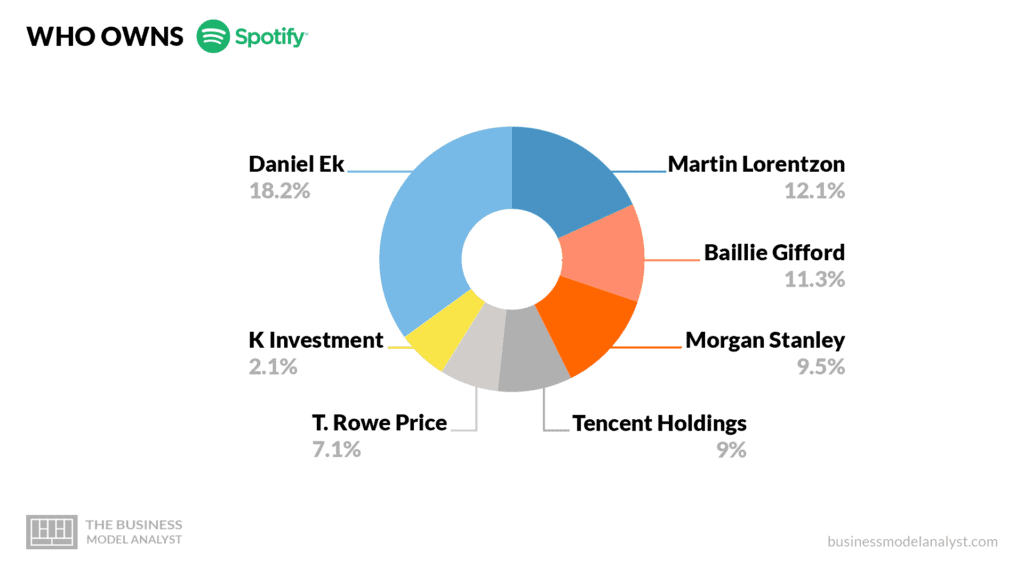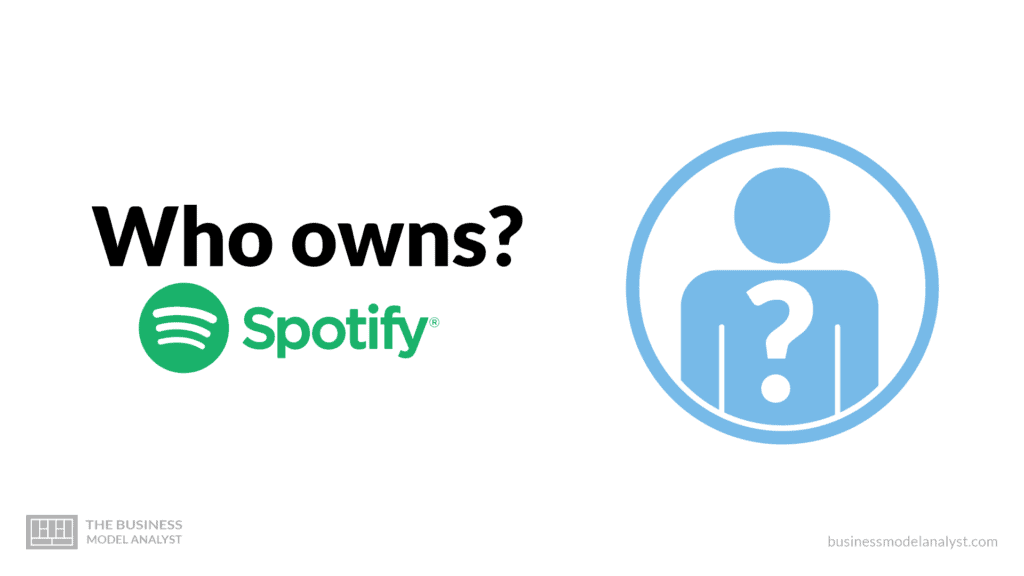Although Spotify’s remarkable success has led to its popularity, the question of who owns Spotify still remains. Despite it being a publicly traded company, the majority ownership of Spotify remains with its two co-founders, Daniel Ek and Martin Lorentzon.
Founded in 2006, Spotify has since grown to become one of the largest music streaming platforms in the world. With close to 460 million monthly active users and over 190 million paying subscribers, Spotify has become one of the major players, if not the major player, in the streaming landscape. The company went public in 2018, and its current market capitalization is around $15 billion, a figure that has plummeted from its 5-year peak of $69.35 billion in February 2021.
Contents
Spotify’s Initial Owners
Daniel Ek and Martin Lorentzon
Spotify was founded by Swedish entrepreneurs Daniel Ek and Martin Lorentzon. They founded the company with a mission to “unlock the potential of human creativity by giving a million creative artists the opportunity to live off their art and billions of fans the opportunity to enjoy and be inspired by it.”
Who is Daniel Ek?
Daniel Ek, the current CEO of Spotify, was the co-founder and CEO at the time of the company’s founding. Ek is a Swedish entrepreneur and investor who began his career as a computer programmer. Prior to founding Spotify, Ek worked at several tech companies, including Stardoll, a social dress-up game, and uTorrent, a peer-to-peer file-sharing program.
He served as a senior executive of the Nordic auction company Tradera, which was eventually purchased by eBay in 2006. Soon after, he took on the role of Chief Technology Officer at Stardoll, a gaming and fashion community, before launching Advertigo, an online advertising firm. The business was sold to TradeDoubler in 2006. After parting ways with Advertigo, Ek was hired as CEO at uTorrent and worked alongside its founder, Ludvig Strigeus, until December 2006, when the platform was bought by BitTorrent.
Who is Martin Lorentzon?
Martin Lorentzon, the co-founder of Spotify, is a Swedish entrepreneur and investor who is currently the chairman of the board. Born in Marieholm, Småland, Sweden, Lorentzon studied engineering at the Chalmers University of Technology and, a few years later, started his own software company, Netstrategy, with Felix Hagnö in 1999, which later became TradeDoubler. TradeDoubler has become one of Europe’s leading performance-based digital marketing companies.
Since the company’s founding, Spotify has grown to become one of the most successful music streaming services in the world.
Initial Investment
In 2008, the duo raised a $21.6 million investment from the Northzone venture capital firm and Creandum. This investment allowed them to build a team, launch the product, and gain traction in the market. The company then raised an additional $50 million in 2009 from several investors, among which Horizon Ventures was the lead investor. Another €11.6 million was also raised in 2010 from a group of investors, including Goldman Sachs. This initial investment of €170 million has been instrumental in helping Spotify get off the ground and become the world’s largest music streaming service.
Subsequent Investment Rounds
In its Series D round of fundraising in 2011, Spotify raised $100 million from new investors Kleiner Perkins Caufield & Byers (KPCB) and Accel Partners. Spotify was able to enter new markets because of this round of funding, including France and Germany. In its Series F round of investment in 2013, Spotify raised $250 million with the addition of Technology Crossover Ventures (TCV) as a new investor. Gibraltar Ventures and Matt Bellamy both invested in this round as well. With the help of this round of funding, Spotify was able to enter new markets like Mexico, Australia, and New Zealand.
In 2015, Spotify raised $526 million in its Series G round of funding, with Rinkelberg Capital, which has long exited the company, joining as a new investor. This round was led by existing investors such as Goldman Sachs Investment Partners, Technology Crossover Ventures, and others. This round of funding allowed Spotify to expand into other countries, such as India. In that same year, the company announced its podcast and video features, as well as the feature that allows music to adapt to a runner’s pace.
In total, Spotify has had 18 rounds of funding since its launch, with the last one taking place in February 2021.
Continuous Growth
Over its years in the music industry, Spotify has experienced continuous growth. As of January 2022, Spotify had 456 million monthly active users and 195 million paid subscribers. This growth has been driven by the company’s focus on creating a diverse library of content, expanding into new markets, and launching personalization features. Additionally, Spotify has grown its user base through marketing campaigns and partnerships with other companies.
Recent Changes to Ownership Structure
In recent years, Spotify has undergone a number of changes to its ownership structure. In 2018, shortly after Tencent’s investment, Spotify completed a major restructuring that saw it become a public entity after going public on the New York Stock Exchange. Following the IPO, the company’s ownership structure changed significantly.
Mergers and Acquisitions
Spotify has been involved in a number of mergers and acquisitions in recent years. In 2014, the company acquired the music streaming platform, The Echo Nest, to bolster its music recommendation capabilities. In 2016, Spotify acquired the online marketing company The Trade Desk. This move allowed Spotify to gain access to the company’s extensive library of marketing tools, as well as the ability to create more targeted campaigns for Spotify users.
These strategic moves have solidified Spotify’s position as one of the leading music streaming services in the world. However, these moves have not been without criticism, as some industry experts have argued that these acquisitions have diluted the value of the company’s stock as well as its potential to offer a viable alternative to other streaming services.
In 2019, Spotify acquired podcasting companies Gimlet Media and Anchor to strengthen its presence in the podcasting industry. In 2020, the company added to its podcasting portfolio with the acquisition of podcasting company Megaphone.
Ownership of Majority Shares

Spotify is owned by a variety of different stakeholders. The majority of the company’s shares are owned by its founders, Martin Lorentzon, who, as of January 3rd, 2023, owned 10.9% of Spotify’s total shares, and Daniel Ek, who owns 7.3% of the company’s total shares. The company’s largest institutional shareholder is investment firm Baillie Gifford & Co., which owns a 14.5% stake in the company.
Other major institutional shareholders include T. Rowe Price, which owns a 6.18% stake, and Morgan Stanley, which owns a 3.66% stake. The company also has a number of other institutional and individual shareholders, such as Tencent, which owns an 8.61% stake, and Sony Group Corporation, which owns a 2.65% stake.
Current Owners of Spotify
Daniel Ek and Martin Lorentzon remain the major shareholders of the company and have a controlling stake in it. Other investors and owners of Spotify include Tencent Holdings, Baillie Gifford, T. Rowe Price, and Morgan Stanley. These investors have also helped to fuel the growth of the streaming platform.
Tencent
The Chinese internet behemoth Tencent is one of Spotify’s biggest investors. It is one of the largest video game companies in the world and is also prominent in the music streaming industry. Tencent was first listed as an investor in Spotify in December 2017 and currently holds an equity holding of 8.61%. Additionally, 16.5% of the Spotify holdings are owned by Tencent.
Tencent owns stakes in other music streaming companies, such as Universal Music Group and Warner Music Group. It acquired China Music Corporation in 2016. Tencent’s involvement in Spotify has allowed the streaming giant to expand its presence in Asia, where the Chinese company has a strong presence.
Conclusion
Spotify has become one of the most successful music streaming services in the world and has managed to attract nearly half a billion users in the last few years. Its success has been largely attributed to its innovative business model, which has enabled it to offer its users an unprecedented selection of music and other audio content.
Despite the current economic uncertainties, the company’s user base continues to grow. With its strong market position and value proposition, Spotify is well-positioned to further capitalize on the rapid global shift to digital music streaming.


